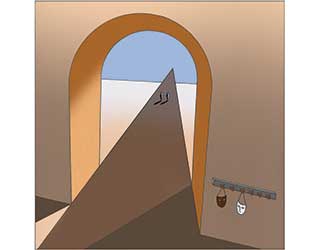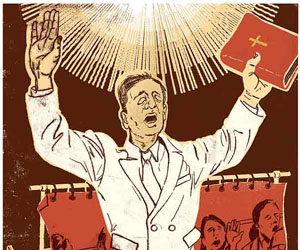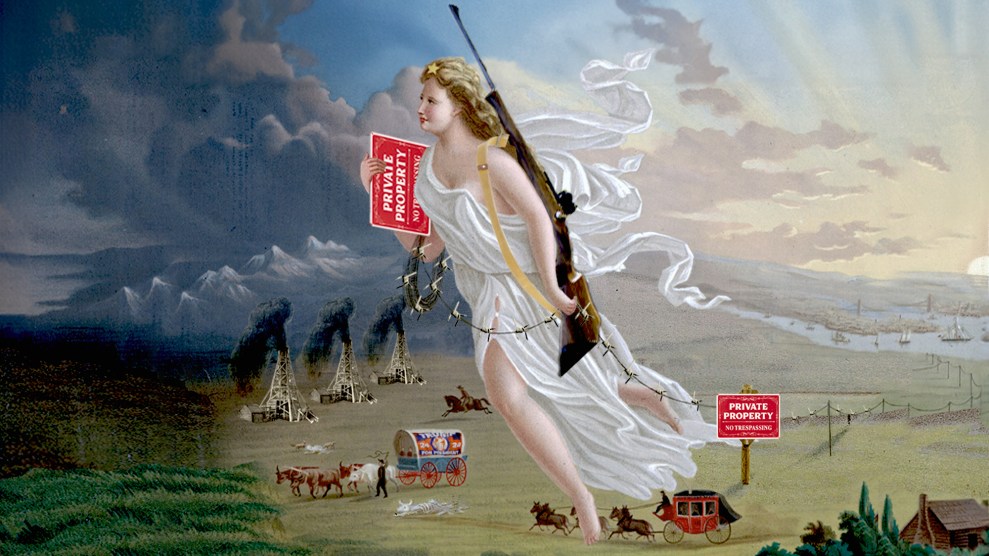Ta-Nehisi Coates has some interesting thoughts on how racism cosmetically updates itself to accomodate modernity but remains the same at its core. He’s riffing on the whole tea party phenomenon; here’s the (longish) setup for the thought I found most interesting:
One common refrain of black Southeners from Robert Smalls to Booker T. Washington to Martin Luther King is the notion that white Supremacy has actually corrupted the white South, that while it is a blight on the physical conditions of blacks, it is a greater blight on the spiritual, moral, and mental conditions of whites.
…when you think about the embrace of white supremacy by political leaders, you understand that it was not simply an embrace of evil and bigotry, but an embrace of superstition, ghost stories and, ultimately, utter ignorance. At times this has been literally true. There’s a short portion in Capitol Men that discusses a late 19th century effort by the federal government to upgrade public schools in the South. For fear that black schools might benefit, South Carolina declines all federal help thus fucking over its white children in the name of white supremacy….
Likewise, when Jesse Helms tells white North Carolians that all their economic troubles can be summed up by Affirmative Action, he is telling them, “don’t think too hard.” When Mike Huckabee goes to South Carolina and says… You don’t like people from outside the state coming in and telling you what to do with your flag. In fact, if somebody came to Arkansas and told us what to do with our flag, we’d tell ’em what to do with the pole; that’s what we’d do. He’s saying, Don’t think too hard about history. Go kick some ass.
Then Coates gets to the good part:
I think this amazing quote from Joe the Plumber says it all:
People don’t understand the dictionary—it’s called queer. Queer means strange and unusual. It’s not like a slur, like you would call a white person a honky or something like that. You know, God is pretty explicit in what we’re supposed to do—what man and woman are for. Now, at the same time, we’re supposed to love everybody and accept people, and preach against the sins. I’ve had some friends that are actually homosexual. And, I mean, they know where I stand, and they know that I wouldn’t have them anywhere near my children. But at the same time, they’re people, and they’re going to do their thing.
So much of this is so perfect—including the idea that “honkey” is the worst slur Joe can think of. But his attitude toward not letting “queers” around his children, is oddly reminiscent. Much as the racist demagouges of yore convinced themselves that highest aim of black maledom was to bed their fugly-ass daughters, Joe the Plumber is convinced that the highest aim of all queerdom is to spend some time with his snotty-nosed brats.
What’s also perfect about this is “Joe The Plumber‘s” utterly subconscious but rock hard belief that the rest of us would actually benefit from, let alone enjoy, spending time with him and his spawn. Conversely, withholding them from gays etc. is a punishment, it’s a withholding of the blessings of exposure to the innately superior.
The never ending narcissism of bigotry never, ever ceases to amaze me. I wouldn’t let my kids share a McDonald’s playground, Central Park or an airplane with his and I’m not queer. Just imagine what his kids must be like. Even worse, what they’ll grow up to be.
But the notion of bigotry as superstition, ghost story and ignorance is an interesting one. Imagine the medieval mindset it took to abhor the notion of drinking from the same water fountain as blacks, or swimming in the same pool. Every vestige of equality – using the same doorway, sharing sidewalks, trying on department-store clothes a white might later buy – had to be harshly squashed lest whiteness be…what? Diminished. Proven not innately superior but simply ‘different than’. Not special.
Now, a mere conversation with a ‘queer’ would render a homophobe’s children…what? Gay? No, I think it goes deeper than that. “Joe” fears that exposure to gays, the mainstreaming of gays, the acceptance of gays, would make his children…tolerant. Horrors. Because that would mean that Joe was…wrong. It might make his children question his no doubt blustering, domineering style of fatherhood and everything else he’s likely pounded into them, Bill O’Reilly style. I might make them think for themselves.
Coates summed it up nicely: “Don’t think too hard.”
Good luck with that, “Joe.”











